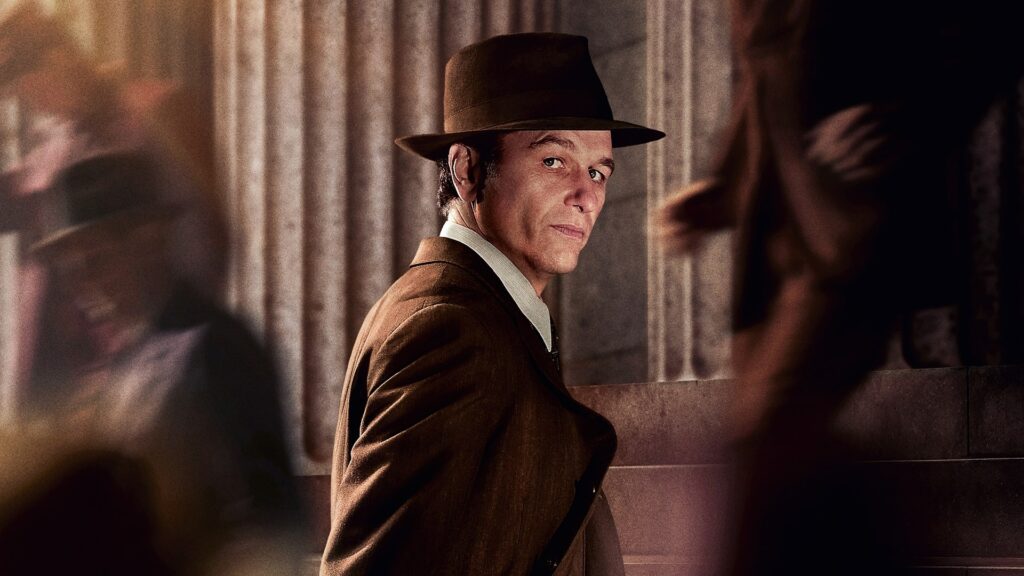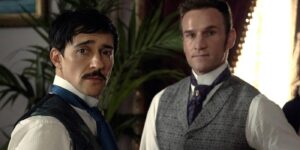
Today, I explain why you should probably not be embarrassed by a property if you plan on adapting it.
This is the Cronin Theory of Pop Culture, a collection of stuff I’ve noticed over the years that I think hold pretty true.
HBO has pulled the plug after two seasons of the Perry Mason reboot that starred Matthew Rhys as the famous Los Angeles lawyer from the novels of Erle Stanley Gardner, with the twist in this reboot being that the show will be set in the timeline of Gardner’s original novels, which was the 1930s (and that the show will show the origins of how Mason became a lawyer in the first place).
One of the famous cliches about reboots in the streaming era is that it seems like every show starring a famous character has decided that it wants to spend its first season showing the origins of the famous character, and thus, we don’t get to actually see the famous character do any of the things that they are famous for until the very end of the first season. Perry Mason was definitely an example of that, with the first season showing Mason as a private investigator who is forced to become a lawyer when the lawyer he works for kills himself, and their client (who Mason believes is innocent of the murder of her own child) would have no shot at an acquittal unless Mason represents her.
Okay, so that’s a weird approach, but whatever, the first season ends with Mason established as a lawyer, with his partner, Della Street (Juliet Rylance), now studying to be a lawyer herself unlike the original stories, where Street is Perry’s assistant, and his private detective, Paul Drake (Chris Chalk, now a Black former cop), firmly on Perry’s payroll, just like the famous Perry Mason TV series from the 1950s and 60s. So it seemed like Season 2 was poised to be like the original series. Except…it wasn’t.
So already, Season 1 was a bit of, “Ugh, Perry Mason? The lawyer guy who always defends innocent people? Let’s try to avoid having him be a lawyer for most of the season.” But then, Season 2 decided to just go COMPLETELY against type. Here’s the show’s executive producer, Michael Begler, on why they decided to have Mason’s season-long trial in Season 2 be defending two brothers who DID commit murder:
Perry, Della, and the firm are defending people who technically are guilty this time around. How do you think this showcases the hallmark traits of these characters?
We really from early on wanted to play with that, because I think when people think about [the original] Perry Mason … he defends the every man. And probably 99.9 percent of the time, they’re innocent. He gets the other person to admit guilt on the stand. And we said, what happens when that’s not the case? What happens when they are guilty? And especially with the character of Perry, who we are starting from such a low place, he doesn’t know if he has the goods to do this and is questioning whether he even wants to be in L.A., if he wants to run off with Lupe, or if he just wants to leave it all behind. Because of the results of the Emily Dodson case, it just upped the ante for him so much. And I think that that was such an interesting world to play in for him.
That just mystifies me so much. It’s your second season, you’ve already essentially wasted a season on setup (note that the showrunners on the show changed between seasons, so we can’t knock the current showrunners for what happened in Season 1, but they still had to deal with it, so they don’t get off the hook that easy), and then you want your SECOND season to ALSO be “You know Perry Mason? How about not that at all? Would that appeal to you?”
The most famous Agatha Christie novel starring Hercule Poirot, Murder on the Orient Express, plays with the standard Poirot formula in a big way (I won’t spoil how it does so), but the key thing is that A. It was the TENTH Poirot book, so Christie obviously first established the formula before breaking from it, and B. When the story has been adapted into film as a standalone movie (in 1974 and 2017), both times the filmmakers made sure to FIRST show Poirot solve a case TRADITIONALLY and confirming that this is the sort of thing Poirot normally does, before sending him on this ATYPICAL Poirot adventure.
In other words, as Belger even notes, if people know Perry Mason at all, they know him for “he defends the every man. And probably 99.9 percent of the time, they’re innocent. He gets the other person to admit guilt on the stand,” and the show then proceeds to NEVER DO THAT (Della gets a nice moment in court in Season 2, and Perry has a dream sequence in Season 1 where he does traditional Perry Mason stuff, which is even more insulting, right? “You know the thing you people think about when you think of Perry Mason? We’ll show it as a dream sequence to mock how stupid the thing you like is, while you watch this adaptation of the thing you like”).
I get it, the Perry Mason TV show could be a bit hokey, but that’s the key, if you’re embarassed by the property you’re adapting, why are you adapting it? If your adaptation is “You know this character? What if we adapt that character, only not do any of the things the character is famous for?” then that is probably not a good idea. You can just try to do the “hokey” stuff in a way that ISN’T hokey!
I say “maybe” in the title and “probably” here, because, of course, there are obviously exceptions where this makes sense, but boy, it sure didn’t seem to work for Perry Mason, and we only got two seasons of the show as a result, despite some excellent performances by Rhys, Rylance and Chalk. It’s a real shame. So please, showrunners, just first try actually adapting the thing you’re trying to adapt. Look at The Little Mermaid. It’s a huge hit, and in great part because it took a story everyone liked, and…adapted it. Making Della gay, or Paul Black, those aren’t important changes, but making the show NOT be about a brilliant lawyer who proves innocent people not guilty, then why are you even adapting Perry Mason? What is great about Perry Mason beyond the basic premise of Perry Mason? It’s a murder mystery starring a lawyer. That’s the hook! Just use the freakin’ hook! You can play around with the formula as time passes, but not before you ever actually do the ACTUAL formula first! You have to do the formula before you can rebel against the formula!
It’s like doing a Columbo reboot where Columbo doesn’t solve the murder, and never says, “Just one more thing” (meanwhile, Rian Johnson and Natasha Lyonne are having great success by just taking the Columbo format seriously with Poker Face). You can do interesting new things while still being faithful to the original material. If it embarrasses you, maybe adapt something else.










It’s like making a Fantastic 4 movie and making it all grounded and realistic and shit. Or making Superman a miserable angsty bastard.
Oh… Wait… Bad examples.
Hi—thanks for the article! Its rare that I am inspired to respond to stuff like this, particularly in this case because I am going to take up a counter position to your POV. But despite that I did enjoy the article and I don’t think that you are wrong in the general philosophy of having respect for the original lore when rebooting so I hope I don’t come off as too negative.
My takeaway is from the article is you’re offended at this particular reboot because they didn’t immediately give you the comfort of retreading the same old thing the 50s-60s Perry Mason did. But if they gave you nothing significantly new (and I don’t mean diversity in race or orientation or even production values) then what’s the point? It seems the showrunners of both seasons thought of Raymond Burr’s Mason as an endpoint and not a beginning. Kind of fair since that Mason never really changed at all during the show’s run except for getting noticeably older (not a dig—that’s just tv back then). The first season gave us the why behind Mason’s career, the second gave us a situation that Mason would have had to have faced at the beginning of his career—I refuse to believe he always had an unerring sense of the innocence of his clients. This has to be a learned skill borne out of hard, bitter experience. Who knows what new facet this new Mason might have gained on his journey to Raymond Burr if a third season would have been granted.
Mr. Cronin, you’ve just stated the problem with every remake of an old, popular series. The showrunners and writers of the new version can’t help thinking, “We can do it better!” That usually involves edgier plots (if a drama), more sarcastic or caustic humour (if a comedy), and depicting the heroes with feet of clay up to their knees.
And let’s not forget the modern sensibilities that insist that those old shows had culturally outdated characters and attitudes. Those have to go, of course.
The result is the remade show lacks much of the quality that made the original version a hit.
I’m sure I’m overlooking a rare exception or two, but I came in with the golden age of television, and I can’t think of a single remade show that I found better than the original.
The problem is a lot of remakes or adaptations fail to ask the basic question What does the average viewer know about the character? And keeping that, everything is can be changed, The Flash for example all a non fan would know is Red Costume with lightning bolt, runs really fast, or Mission Impossible is the masks and the theme tune, those are successful because the audience expects them and gets them.
There was a surprisingly long period when studios would take what were at the time serious dramas and decide they were comedies so spent millions making flood like Dragnet or Starsky and Hutch because they decided that’s what the audience wanted so changed the format rather than making a parody.
One final oddity, you mention Poirot studios seem to constantly place every story in the 20s or 30s in the belief that the audience won’t accept the character in more modern times despite the fact that they were being written and set in, and quite successfully, in the 60s and 70s, so scenes where an older Poirot discusses Computer Dating or Beatlemania are edited out in favour of yet more references to upper class parties, there is a Marple novel, At Bertrams Hotel, where the entire point is that it’s a 60s hotel designed to remind older guests of the 20s-30s so setting it in the 20s is particularly pointless.
I had this same feeling and same discussion with people after watching Rian Johnson’s Star Wars movie. It felt like he knew everything that made Star Wars work, but he was contemptuous of their optimistic tone and wanted to deconstruct them.
There was one scene in the movie that felt like it was created by a different filmmaker entirely (the Force explanation scene) because it was a genuine, warm look at the lore of the universe Lucas created. The other scene that felt like a true Star Wars scene was Rose’s scene where she stopped Finn’s suicidal rush.
You ask “why adapt a property if you don’t like it,” and the answer is always money.
The sheer volume of TV shows and films produced and/or directed by people who clearly hated the property is staggering. Sometimes, it turns out good. Kenneth Johnson, for instance, is far from shy from claiming he hated comic books and considered them the bottom of the barrel of entertainment; he still developed, produced, directed and/or wrote “THE INCREDIBLE HULK” for 5 seasons on CBS. Yet not only was it good, the MCU to this day is heavily inspired by it regarding the Hulk. Tim Burton was also not shy about “not understanding or liking” Batman, yet he directed 2 successful films about Batman which were both good and inspired not only an even better animated series (and related media) but also influenced the comics as well (albeit in some “troubling in hindsight” ways, like focusing 99% on the villains).
The CW and/or DC Comics are pretty infamous for this kind of approach. “SMALLVILLE” ran 10 seasons and was about Superman before he became Superman, or Superboy, or even wore a costume even though he was literally teaming up with the Justice League and/or JSA by the end. “GOTHAM” was 5 season of, basically, “Batman without Batman,” just Jim Gordon running around for years until Bruce Wayne got old enough (barely, and only if he stood on a milk crate) to put on a mask and fight crime near the end. “ARROW” started before Oliver Queen actually called himself, well, Green Arrow and he was just “the Vigilante” with mascara over his eyes for 1-2 seasons. “DAREDEVIL” did the same thing, only Murdock was “The Devil from Hell’s Kitchen” for seasons. And no end of superhero films have been made by directors and/or producers who clearly have contempt for the franchise and are only doing it for alimony or cocaine. From “FAN4STIC” to Zack Synder’s entire career after “WATCHMEN” to even a few of the pre-MCU Marvel movies (like “DAREDEVIL,” where the director very clearly wanted to remake “THE CROW”), and on it goes. Even 2004’s “THE PUNISHER” is like that, with Frank Castle not wearing a skull shirt and dedicating himself to punishing criminals (rather than wanting personal and specific revenge) until a second before the credits.
But the answer is always money. For enough cash, Steven Spielberg would make a “TWINKIE THE KID” movie and then breathlessly proclaim that it is high art of the utmost quality that HAD to be told. Anyone would. The question is, kind of like Jay Sherman once said, if we stop watching bad remakes, maybe they’ll stop making bad remakes.
Multiple thoughts:
1)It’s true Ollie didn’t call himself Green Arrow in ARROW but he’s still Oliver Queen, running around and using a bow and arrow to fight crime.
2)This is a common problem with adapting kid stories: what if a charming setting like Oz or Wonderland were DARK AND EVIL? Ooooh! That’s been done for at least forty years now, but creators still think it’s edgy and new.
3)In the case of Perry Mason, I wonder if part of the issue is that “heroic defense attorney” isn’t a thing in TV much any more. The hero attorneys are all prosecutors.
4)In response to Dave: the thing is, the Burr series wasn’t that different from the books (though book-Perry didn’t extract confessions on the stand in most of them). It’s not like HBO was trying to get back to the original roots of the character — they’re ignoring the source material too.
Well written and well thought out piece.
I would add that HBO seemed to take its inspiration from the books, which are grittier and contain more peril than the saccharine Burr TV series.
just imagine if someone revived Mission Impossible but started off with their intricate plan (of the type the TV series was known for) going completely wrong and the team dying, and after that, not trying to emulate the TV series and, worse, making a regular character from the TV series into a bad guy.
CC: The Producers of Catwoman
The short answer is that Perry Mason (and the others) are recognizable properties, IP with some threadbare nostalgia clinging to them, and the showrunners really don’t care what fans remember of the original. They’re just out to exploit the name rather than invent “Larry Shmason, Persecutor of the Innocent” or what have you. It’s an easier sell to lazy, unimaginative studio execs when there’s an actual brand attached… and fans who don’t like the “new and degraded” version probably aren’t your target audience anyway.
PS, great essay and couldn’t agree more– if “show creators” want to adapt source material, there should be some built-in commitment to fidelity to that material. Taking a title and character names isn’t adaptation; it’s harder than that. Maybe that’s why some don’t bother to try.
Corollary: Don’t write a film about, say, fighting alien bugs or an escaped robot and then decide it’s similar to existing property, buy that property, change some names and claim it’s a “Starship Troopers” film or a “I, Robot” film.
Regarding Poirot, I don’t think it’s any stranger than setting Holmes in the Victorian era when Doyle wrote stories set all the way up to the start of WW I. They were both contemporary characters then but now they’re period pieces